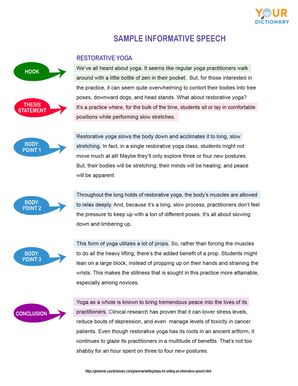

Consider a topic you're truly passionate about. Imagine you were able to share all your knowledge with a roomful of people. Who knows what kind of a revolution you could begin? You might transform everyone into avid gardeners or spiritual gurus. Below, we've outlined five steps for writing an informative speech. It'll help you take all those thoughts and share them with the audience in a clear and deliberate manner.
1. Choose a Precise Topic
By precise, we mean if there's any way to take a more generalized topic and narrow it down into more specific terms, go that route.
For example, you could inform your audience on the history of yoga, or you could inform your audience on a particular form of yoga. The more specific you get, the easier and more targeted your research will be. Your delivery will benefit tremendously too.
2. Draft an Effective Thesis Statement
With your topic of interest, it's time to draft a thesis statement. If you've done it right, your thesis statement will summarize the entirety of your speech in one concise sentence. It doesn't have to be dry either.
Let's continue with our yoga theme. If you opt to discuss restorative yoga specifically, your thesis statement can be something like, "Restorative yoga is a slow moving practice geared toward gentle healing." Now, your audience understands the direction your informative speech is about to take and will, hopefully, be interested in learning more.
In What Is a Thesis Statement?, we help you understand the importance of this one line. We also provide a few samples to help you get your mind in the right place.
3. Consider Your Crowd
This one may seem like common sense, but it's more than just choosing the right topic. It's true that you wouldn't deliver an informative speech on the V8 engine of a Cobra to a classroom full of fledgling beauticians. But, there's more to consider than appropriateness.
You also want to write an informative speech with language that's simple. Try to forego too many complex terms or inflated language when simpler terms will do. Always speak to the guest in the room, or the person with the least knowledge in the room. This will keep your message clear, your thesis statement apparent, and your audience in tune.
4. Start Your Outline
Armed with your thesis statement and a clear vision of your crowd, it's time to start taking everything you want to say and lining it up in a clear and concise manner. If you've been able to take your topic to more specific terms,you're already one step ahead of the game.
This will vary, based on time constraints, but try to aim for about three poignant points. This will give you three pertinent details to share about your topic while you bolster them with interesting facts, statistics, and narratives. Or, if your informative speech is taking on more of a "how to" formula, then an outline will help ensure you're laying out the proper steps for success.
There are four main types of informative speeches:
- Descriptive - These speeches help the audience develop specific images and understandings of particular people, places, or things. For example, you might deliver an informative speech on a particular region of the world.
- Demonstrative - These speeches describe how to perform a specific action. For example, you might demonstrate to your audience how to setup their new MacBook Pro.
- Explanation - These speeches explain a topic. For example, you might explain the current state of affairs with the election process.
- Definition - This type of speech will require a more in-depth topic. You're explaining a concept or theory. For example, you might define photosynthesis and explain its impact on the ecosystem.
No matter the type of speech you select, a Keyword Outline may be your best friend. It'll help you maintain a clear vision and ensure you've covered all the important components of your topic.
5. End With a Call to Action
Most articles and essays end with a call to action. An informative essay is, of course, different than a persuasive essay. But, if your topic is interesting enough, it'll naturally entice the audience to want to learn more.
Let's return to our example of restorative yoga. Even if your speech is purely information (the history of the practice, the benefits touted by doctors and therapists, the number of people in the world who practice it, and so on), if it's interesting enough, it will persuade the audience to think about it further.
Suggest people read more about your topic. Encourage them to never stop learning. These gentle, altruistic calls to action are a nice way to wrap up and encourage your audience to keep learning.

Start Sharing Your Knowledge Today!
Informative speeches are a wonderful way to share all that knowledge bouncing around in your brain. With a clear vision, a precise thesis statement, and a tidy outline, you're well on your way!
Choose something you're genuinely interested in and that enthusiasm will naturally shine through with your audience. Take a look at these Tips on Speech Writing next. It'll be a nice review as you wrap up your speech writing process.